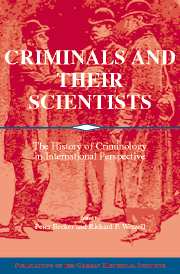Book contents
- Frontmatter
- Introduction
- Part One Nonacademic sites of Nineteenth-Century Criminological Discourse
- Part Two Criminology as Scientific and Political Practice in the Late Nineteenth and Early Twentieth Centuries
- 6 Cesare Lombroso and Italian Criminology: Theory and Politics
- 7 Criminal Anthropology: Its Reception in the United States and the Nature of Its Appeal
- 8 From the “Atavistic” to the “Inferior” Criminal Type: The Impact of the Lombrosian Theory of the Born Criminal on German Psychiatry
- 9 Criminology, Hygienism, and Eugenics in France, 1870-1914: The Medical Debates on the Elimination of “Incorrigible” Criminals
- 10 Crime, Prisons, and Psychiatry: Reconsidering Problem Populations in Australia, 1890-1930
- 11 Positivist Criminology and State Formation in Modern Argentina, 1890-1940
- 12 The Birth of Criminology in Modern Japan
- Part Three The Making of the Criminologist
- Part Four Criminology in the First Half of the Twentieth Century: The Case of Weimar and Nazi Germany
- Index
8 - From the “Atavistic” to the “Inferior” Criminal Type: The Impact of the Lombrosian Theory of the Born Criminal on German Psychiatry
Published online by Cambridge University Press: 05 January 2013
- Frontmatter
- Introduction
- Part One Nonacademic sites of Nineteenth-Century Criminological Discourse
- Part Two Criminology as Scientific and Political Practice in the Late Nineteenth and Early Twentieth Centuries
- 6 Cesare Lombroso and Italian Criminology: Theory and Politics
- 7 Criminal Anthropology: Its Reception in the United States and the Nature of Its Appeal
- 8 From the “Atavistic” to the “Inferior” Criminal Type: The Impact of the Lombrosian Theory of the Born Criminal on German Psychiatry
- 9 Criminology, Hygienism, and Eugenics in France, 1870-1914: The Medical Debates on the Elimination of “Incorrigible” Criminals
- 10 Crime, Prisons, and Psychiatry: Reconsidering Problem Populations in Australia, 1890-1930
- 11 Positivist Criminology and State Formation in Modern Argentina, 1890-1940
- 12 The Birth of Criminology in Modern Japan
- Part Three The Making of the Criminologist
- Part Four Criminology in the First Half of the Twentieth Century: The Case of Weimar and Nazi Germany
- Index
Summary
Hermogenes: For my part, Socrates, I have often talked with Cratylus and many others, and cannot come to the conclusion that there is any correctness of names other than convention and agreement. For it seems to me that whatever name you give to a thing is its right name; and if you give up that name and change it for another, the later name is no less correct than the earlier, just as we change the names of our servants; for I think no name belongs to any particular thing by nature, but only by the habit and custom of those who employ it and who established the usage. But if this is not the case, I am ready to hear and to learn from Cratylus or anyone else.
Socrates: It may be that you are right, Hermogenes; but let us see.
- (Plato, Cratylus)defining the offender
Different meanings and interpretations of “reality” are implied in scientific definitions. Definitions are limiting through their labeling role, especially when the reality in question is not an inanimate object but a deviant individual. They function as useful conventions only if we are conscious of how dangerously static they are. Theoretical systems that scientifically explain forms of criminality are therefore connected with hermeneutic, terminological, and definitional problems. Concepts such as those of the “born criminal” or “atavism,” which were introduced by Cesare Lombroso and his followers and became common in the criminological debates at the end of the nineteenth century, became more popular and seemed to acquire increasing autonomy from the theories that gave rise to them.
- Type
- Chapter
- Information
- Criminals and their ScientistsThe History of Criminology in International Perspective, pp. 183 - 206Publisher: Cambridge University PressPrint publication year: 2006
- 3
- Cited by



